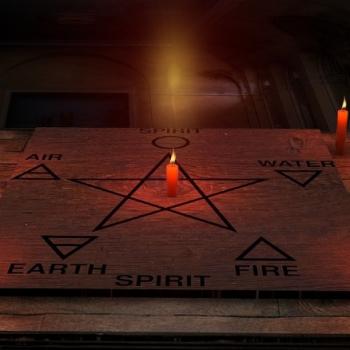A few month ago science fiction writer and blogger Cory Doctorow dug up a fascinating 1940 review by George Orwell of Hilter’s Mein Kampf. What makes this review timeless, and relevant and important today, is that Orwell nails what it is about authoritarianism — beyond the charisma of any individual leader — that makes it attractive to so many. This is key to understanding today’s headlines, to see what motivates both ISIS fighters and American cops: the glory and beauty of the struggle.
Hitler, because in his own joyless mind he feels it with exceptional strength, knows that human beings don’t only want comfort, safety, short working-hours, hygiene, birth-control and, in general, common sense; they also, at least intermittently, want struggle and self-sacrifice, not to mention drums, flags and loyalty-parades….All three of the great dictators [Hitler, Mussolini, and Stalin] have enhanced their power by imposing intolerable burdens on their peoples. Whereas Socialism, and even capitalism in a grudging way, have said to people “I offer you a good time,” Hitler has aid to them “I offer you struggle, danger and death,” and as a result a whole nation flings itself at his feet.
American propagandists eventually caught on, and found ways to turn mundane civilian activities into ways to join the struggle. Saving cooking fats or joining a carpool could be part of the war effort — however little effect they might have on the practical aspects of the war, they keep morale up.
The lesson here is not just about World War II or 20th century dictatorships. Whether it is a flaw in our current civilization that we might manage to exorcise in a few more centuries, or is something hard-wired into the monkey brain that we’re stuck with forever, it’s a fact of life in the here-and-now that we’re suckers for a glorious struggle.
We want our lives to have “meaning”, and that implies a plot, a narrative arc; and that in turn implies a narrative conflict. And man-vs-man or man-vs.-society are easy conflicts to find and to understand.
When Conan the Barbarian (riffing off an actual statement by Genghis Khan) says that what is best in life is to “crush your enemies, see them driven before you, and to hear the lamentations of the women”, there is something within us that resonates. (Don’t tell me it doesn’t. I’ve heard too many peace activists quote that line.) The glory of conquest! Or at least the glory of the fight — better to die on our feet than live on our knees, right? Struggle against the vile enemy! Danger and death beset us, but glory awaits we happy few, we band of brothers.
And if there are no enemies at hand? Then some may easily be constructed. Somewhere, sometime, someone has genuinely done you wrong, or wronged someone you love; and if the offenders themselves are not available, someone within convenient reach can be linked to them, cast in the role of an ally of darkness. And we can take pride in holding the line against those barbarians, protecting the truth faith.
Ah, the true faith. Because religion provides a ready-made us-versus-them narrative. It has little to do with the actual teachings of the religion, which in most cases are ambiguous at best or contradictory at worst on the topic of violence. But you don’t even need to know what those teachings are, as so-called “Islamic State” recruits cramming with Islam for Dummies and The Koran for Dummies demonstrate.
It seems to me that the role of religion in fostering violence is less about doctrine or dogma than about religion in its social function, its definition of a community — which, by nature, defines people who are outside that community. And that’s all you need if you’re looking for people against whom to engage in glorious struggle. You can substitute any other way to define a community, any other glorious us-versus-them narrative — Marxism, capitalism, the sham of “democracy”, one’s choice of recreational pharmaceuticals (think beer-drinking cops beating pot-smoking hippies), a sports rivalry, whatever — and get about the same result.
“The Zen Pagan” appears every other Friday. You can keep up by subscribing via RSS or e-mail.
I’ll be presenting at PantheaCon, February 13-16 at the San Jose Doubletree Hotel — if you’re there, say hello.
If you do Facebook, you might choose to join a group on “Zen Paganism” I’ve set up there. And don’t forget to “like” Patheos Pagan over there, too.


















